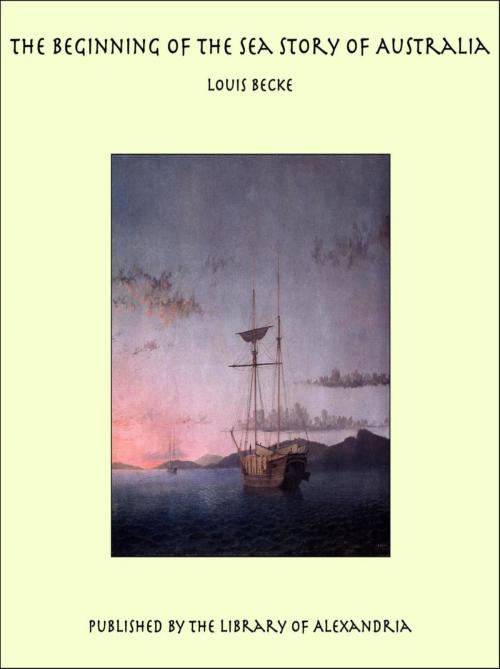The Beginning of The Sea Story of Australia
Nonfiction, Religion & Spirituality, New Age, History, Fiction & Literature| Author: | Louis Becke | ISBN: | 9781465507129 |
| Publisher: | Library of Alexandria | Publication: | March 8, 2015 |
| Imprint: | Language: | English |
| Author: | Louis Becke |
| ISBN: | 9781465507129 |
| Publisher: | Library of Alexandria |
| Publication: | March 8, 2015 |
| Imprint: | |
| Language: | English |
To many people in England the mention of Australia conjures pictures of tented gold-fields and tall, black-bearded, red-shirted bushrangers; of mounted police recruited from "flaxen-haired younger sons of good old English families, well-groomed and typically Anglo-Saxon"; of squatters and sheep runs; of buckjumpers ridden by the most daring riders in the world; and of much more to the same purpose; but never is presented a picture of the sea or sailor folk. Yet the first half-century of Australian history is all to do with the ocean. The British sailor laid the foundation of the Australian nation, and, in the beginning, more than any other class, the sailorman did the colonising—and did it well. This, however, is the story of most British possessions, and generally it is gratefully remembered and the sailor duly credited and kindly thought of for his work. But in these days the dry west wind from the back blocks seems to have blown the taste of brine and the sound of the seethe of the curling "white horse" out of the mind of the native-born Australian; and the sailing day of a mail boat is the only thing that the average colonial knows or cares to know about salt water. To write on such a subject as this, one has to leave out so much, that it is necessary to begin almost in the middle in order to reach an ending. Sea exploration and coast surveying opened the ways; whaling—it may surprise the reader, but it is nevertheless true—was once the main support of Australia and New Zealand; and runaway sailors formed a very considerable part of the back country population, such men making handier and better farm labourers, stockmen, and, later on, miners, by reason of their adaptability to strange surroundings, than ticket-of-leave men or the average free emigrant. The first four successive Governors of Australia—in the beginning, be it remembered, the continent was one colony—were captains in the Navy. Governing in those rough days was not a mere master-of-the-ceremonies appointment, and Phillip, Hunter, King, and Bligh, if they made mistakes, considering their previous training, the populations they governed and the times in which they lived, amply justify Palmerston's words that if he wanted a thing done well in a distant part of the world; when he wanted a man with a good head, a good heart, lots of pluck, and plenty of common sense—he would always send for a captain of the Navy
To many people in England the mention of Australia conjures pictures of tented gold-fields and tall, black-bearded, red-shirted bushrangers; of mounted police recruited from "flaxen-haired younger sons of good old English families, well-groomed and typically Anglo-Saxon"; of squatters and sheep runs; of buckjumpers ridden by the most daring riders in the world; and of much more to the same purpose; but never is presented a picture of the sea or sailor folk. Yet the first half-century of Australian history is all to do with the ocean. The British sailor laid the foundation of the Australian nation, and, in the beginning, more than any other class, the sailorman did the colonising—and did it well. This, however, is the story of most British possessions, and generally it is gratefully remembered and the sailor duly credited and kindly thought of for his work. But in these days the dry west wind from the back blocks seems to have blown the taste of brine and the sound of the seethe of the curling "white horse" out of the mind of the native-born Australian; and the sailing day of a mail boat is the only thing that the average colonial knows or cares to know about salt water. To write on such a subject as this, one has to leave out so much, that it is necessary to begin almost in the middle in order to reach an ending. Sea exploration and coast surveying opened the ways; whaling—it may surprise the reader, but it is nevertheless true—was once the main support of Australia and New Zealand; and runaway sailors formed a very considerable part of the back country population, such men making handier and better farm labourers, stockmen, and, later on, miners, by reason of their adaptability to strange surroundings, than ticket-of-leave men or the average free emigrant. The first four successive Governors of Australia—in the beginning, be it remembered, the continent was one colony—were captains in the Navy. Governing in those rough days was not a mere master-of-the-ceremonies appointment, and Phillip, Hunter, King, and Bligh, if they made mistakes, considering their previous training, the populations they governed and the times in which they lived, amply justify Palmerston's words that if he wanted a thing done well in a distant part of the world; when he wanted a man with a good head, a good heart, lots of pluck, and plenty of common sense—he would always send for a captain of the Navy















